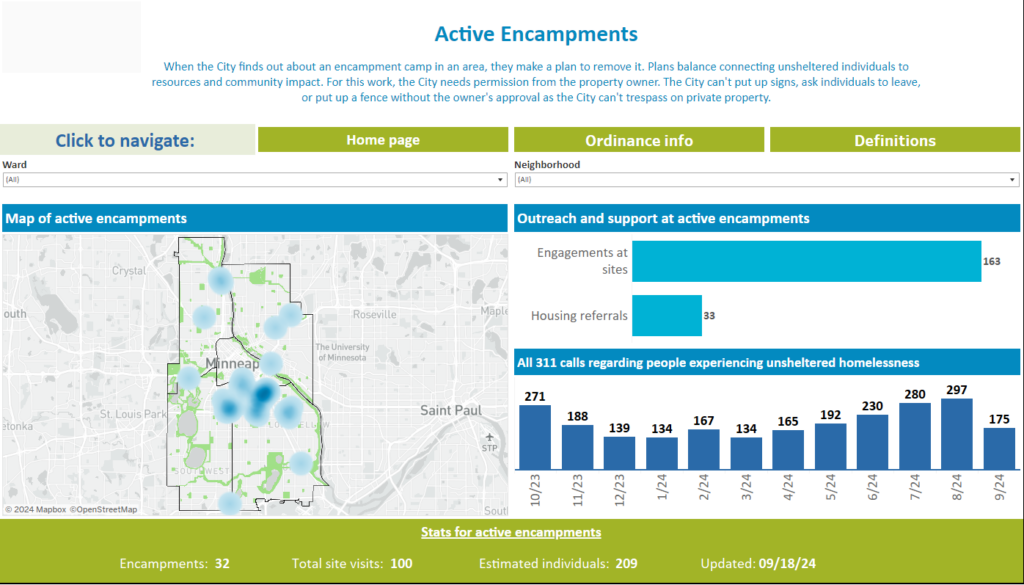Minneapolis City Council passes housing crisis policies as mayor expedites encampment closures
On Thursday, the Minneapolis City Council took steps to address issues surrounding the city’s homeless population.
These plans were already in motion but are taking on new urgency after more violence at encampments this week.
Minneapolis police say two people were shot and killed at two different encampments hours apart on Wednesday. Police have arrested a man and the medical examiner identified one of the victims as 20-year-old Roland Littleowl.
Following the shootings, Minneapolis Mayor Jacob Frey said he is expediting the closure of all encampments.
“The city’s response to homelessness is failing,” Minneapolis City Council President Elliott Payne said.
Several Minneapolis City Council members aren’t mincing words when discussing who’s to blame for the city’s housing crisis.
“Six years ago Mayor Frey promised to end homelessness in the city of Minneapolis, and yet today unsheltered homelessness has only increased in our city,” Minneapolis City Council Vice President Aisha Chughtai said.
On Thursday, the council took several steps including the allocation of $1.5 million dollars for the Agate shelter, which services 137 residents, to prevent them from closing their doors permanently.
“We’re going to help prevent homelessness from happening in the first place,” Payne said.
The council also passed an ordinance extending the notification period required for rental evictions from 14 to 30 days.
“Every tenant who’s given a few more days, a few more weeks to figure out how they’re going to pay their rent is one person we’re keeping off the street,” Minneapolis Council Member Jeremiah Ellison said.
The council also passed another ordinance mandating the city report on the cost and effectiveness of the Frey administration’s encampment sweeps.
“Every encampment sweep costs the city roughly $120,000 and it adds up to millions of dollars every year. When we are investing at that level of resources, we have an obligation to be transparent,” Chughtai said.
On Thursday, Mayor Jacob Frey announced his staff will expedite the closing of all encampments and take steps to prevent them from forming in the first place, adding “several City Council members are trying to prevent the closure of encampments through advocacy, activism, and soon-to-come policy changes. This is irresponsible.”
Frey added, “The ordinance passed by Council includes a majority of items the City is already doing. What it doesn’t do is address the fact that encampments are dangerous and inhumane. While the Council is focused on procedural tweaks and making it harder to close encampments, my administration is focused on expanding access to shelter, combating the fentanyl epidemic, and continuing our nation-leading affordable housing work.”
Mayor Frey had reached a boiling point following the two murders — Wednesday afternoon, he and MPD Chief Brian O’Hara focused in on the fentanyl frustrations.
“It needs to stop,” Frey said sharply. “These encampments are in place, let’s be very clear, because of fentanyl.”
Those in the work of helping substance abuse share some of those frustrations, mainly because it’s getting hard to keep up.
“The community wide problem just sort of continues to feel like it’s outpacing what we’re able to do,” Caroline Hood, president and CEO of RS EDEN.
Hood says they have room for people who need help and offer unique programming through their ‘withdrawal management’ with more than a dozen detox beds part of their substance abuse program.
But, reaching those who need the assistance is easier said than done.
“[They’re] a really vulnerable population that comes attached [with] some community stigma,” Hood said.
Hazelden Betty Ford Foundation, based here in Minnesota, and a national leader in addiction treatment, backs that up.
“A large component that we see maybe lacking right now is access, access to treatment,” Chief Medical Officer for Hazelden Betty Ford Foundation Dr. Alta DeRoo said about a challenge in this fight.
“We’re seeing almost exclusively fentanyl when somebody says that they’re an opioid user,” Dr. DeRoo said.
As for solutions, the two entities feel it’s going to take the community to make an impact.
“It’s not just about creating more housing, it is also creating safe and stable housing, and offering services, and having treatment, and having robust public safety,” Hood told 5 EYEWITNESS NEWS.
A map of encampments in Minneapolis is available here. As of 5:30 p.m. on Thursday, the active encampment map showed 32 encampments in the city.
